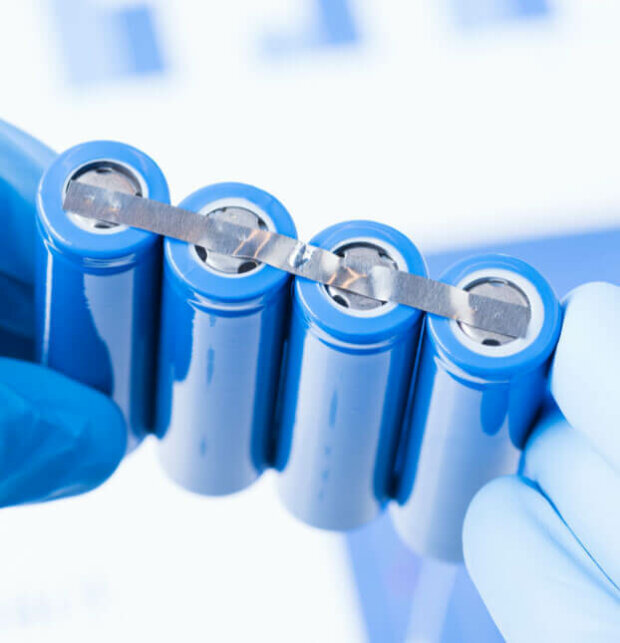Sionic Energy has designed a low-cost, high-performance solution to meet the accelerating demands of the lithium-ion battery market. Our advanced electrolyte additives and silicon anode are designed to integrate with current or planned lithium-ion battery manufacturing processes for a faster speed to market. By taking a phased approach to markets, the company can adapt its technology to the performance and duty cycle requirements within each silicon anode battery market application.

Lithium-ion battery commercial and industrial applications
2025
Aviation and Consumer Electronics
The new generation of drones and aviation products along with consumer electronics are constantly seeking smaller footprints and lower weight associated with their batteries. With the exceptional jump in specific energy—lower weight for high energy performance—Sionic’s battery technology addresses one of the primary design points in lithium-ion drone batteries, as well as batteries for automotive and consumer electronic products.
The new generation of drones and aviation products along with consumer electronics are constantly seeking smaller footprints and lower weight associated with their batteries. With the exceptional jump in specific energy—lower weight for high energy performance—Sionic’s battery technology addresses one of the primary design points in lithium-ion drone batteries, as well as batteries for automotive and consumer electronic products.
2026
Automotive EVs
Critical to sustaining the growth of the electric vehicle (EV) markets is the cost and the safety of the energy storage batteries. Accounting for about one-third (⅓) of the vehicle’s cost, batteries are the primary component for reducing costs and for putting EVs at cost parity with internal combustion engines (ICE) vehicles to encourage accelerated EV adoption. Sionic’s technology has the potential to achieve up to a 30% cost reduction in lithium-ion batteries for electric cars while dramatically increasing energy density performance and mitigating risks of thermal runaway.
Critical to sustaining the growth of the electric vehicle (EV) markets is the cost and the safety of the energy storage batteries. Accounting for about one-third (⅓) of the vehicle’s cost, batteries are the primary component for reducing costs and for putting EVs at cost parity with internal combustion engines (ICE) vehicles to encourage accelerated EV adoption. Sionic’s technology has the potential to achieve up to a 30% cost reduction in lithium-ion batteries for electric cars while dramatically increasing energy density performance and mitigating risks of thermal runaway.
2027
Stationary Storage and Grid Applications
Second only to the growth of batteries for electric vehicles, the stationary and grid storage markets are also seeing accelerated growth and integration of energy storage into distributed renewable energy infrastructure. An attractive solution for both industrial and consumer energy consumption and distribution—cost, as well as safety, are very critical performance factors for batteries in these markets. Sionic’s battery technology delivers a substantial reduction in costs, mitigates the risks of thermal runaway from cell-to-cell propagation, and is adaptable to the newer generation of safe cathode materials being used for these market applications, such as lithium iron phosphate (LFP).
Second only to the growth of batteries for electric vehicles, the stationary and grid storage markets are also seeing accelerated growth and integration of energy storage into distributed renewable energy infrastructure. An attractive solution for both industrial and consumer energy consumption and distribution—cost, as well as safety, are very critical performance factors for batteries in these markets. Sionic’s battery technology delivers a substantial reduction in costs, mitigates the risks of thermal runaway from cell-to-cell propagation, and is adaptable to the newer generation of safe cathode materials being used for these market applications, such as lithium iron phosphate (LFP).

Pushing the envelope on energy storage
Sionic Energy batteries can serve as a lighter and cheaper replacement to the mobility lithium-ion battery market’s 2170 batteries with a current energy density of 1050 Wh/L or 350 Wh/kg and a platform that extends performance beyond the early projections of solid-state designs. Our non-volatile, non-flammable electrolyte additives’ Multi-Functional Molecule (MFM) design methodology can enable specific critical performance enhancements to maximize the effectiveness of any base electrolyte formulation.
Battery TechnologyElectrolyte AdditivesTomorrow starts now
Learn more about opportunities to leverage Sionic Energy’s lithium-silicon battery technology in current and future applications
Contact Us
